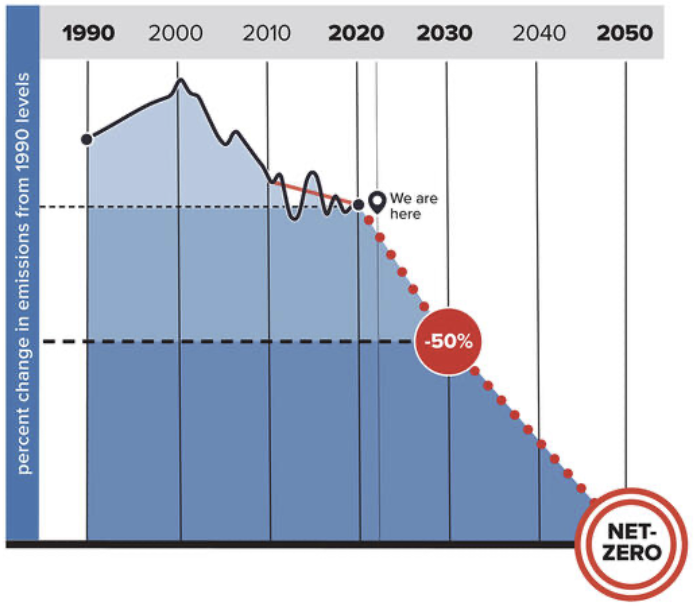
Last week, Portland City Council moved forward on a work plan to address the climate crisis outlining the “actions Portland can and must take to eliminate carbon emissions by 2050.” This plan emerged from City Council’s 2020 Climate Emergency Declaration, which set new, ambitious emissions reductions targets and reentered Portland’s climate plan to focus on climate justice and equity.
But transportation advocates have largely stayed focused on their own work instead of commenting on this work plan at all, and those who have spoken up aren’t impressed by the vague language in the plan and the lack of dedicated funding for many of the action items in the plan. Adding to the unease are recent pro-freeway expansion Council votes which don’t give the City of Portland much credibility when it comes to climate action.
The Bureau of Planning and Sustainability (BPS), headed by Commissioner Carmen Rubio, led the construction of this work plan, but it’s broken up into multiple categories which involve other City bureaus, especially the Portland Bureau of Transportation (PBOT).
There are nine actions outlined in the work plan’s transportation category. They are as follows:

- Make low-carbon travel options safe, accessible, and convenient for all Portlanders.
- Use equitably designed pricing strategies and parking management to encourage less driving when people and businesses have other travel options.
- Decouple transportation funding from fossil fuels.
- Make low-carbon transportation options more affordable, especially for those who can least afford them.
- Support state and regional vehicle miles traveled reduction policies.
- Make new construction ready for electric vehicle charging.
- Make it easier to use electric vehicles if you can’t charge at home.
- Make freight cleaner.
- Replace petroleum diesel at the pump.
The document explains how the city intends to follow through on these actions, with some explanations more detailed than others.
Many action items are vaguely worded and/or have no dedicated funding.
The description for accomplishing the first item is a good example of this. Here, the document says this action item will be accomplished via “allocation of space on city streets for non-single occupant auto trips, increase funding for infrastructure projects, activation and programs that support more people making more trips by walking, biking and transit.”
Other actions are more straightforward: for example, Portland has a plan in the books to price driving and parking in order to reduce car dependency, which gives a bit more weight to the second action item.
“Clapping each other on the back for saying you’ll do something about [the climate crisis] only adds insult to injury.”
– Liam Castles, in city council testimony
The 2020 Climate Emergency Declaration came right after Mayor Ted Wheeler and then-Portland Bureau of Transportation Commissioner Chloe Eudaly revoked their support for the I-5 Rose Quarter expansion project, which added some legitimacy to their climate action ambitions. Now things are different. Not only did the City recently rejoin the Rose Quarter project, they also unanimously voted to support the Interstate Bridge Replacement Program’s (IBRP) Locally Preferred Alternative just a week before adopting the climate work plan. The IBRP will expand I-5 over the Columbia River and advocates don’t think it will provide the active transportation infrastructure necessary to offset the increased car capacity.
At the July 20th City Council meeting when Council heard public comment about the climate work plan, youth climate activist Liam Castles criticized the commissioners for what he sees as their performative support for climate action that doesn’t have any weight behind it.
“You are voting on my future and the future of every young person in Portland,” Castles said. “Clapping each other on the back for saying you’ll do something about [the climate crisis] only adds insult to injury.”
Wheeler responded to Castles by encouraging him to run for City Council in the future.
The commissioners did agree with critics that even the best-laid plans aren’t meaningful if they aren’t followed by action.
“We have a lot of work ahead, and it will take real substantive action from all of us to make the consequential changes that we did for Portland, for our families and for future generations,” Rubio said.
Current PBOT Commissioner Jo Ann Hardesty acknowledged critics by thanking climate activist organizations the Sunrise Movement, Verde and The Street Trust for being good partners “no matter how frustrated they get with us at times.”
While commissioners all agreed to move forward with this plan, they’ll still accept written input until August 24th, when they’ll reconvene on the subject. Commissioners emphasized the ongoing nature of this work and said the plan will continue to evolve as more stakeholders weigh in.
The Pacific Northwest is currently in the midst of a brutal heat wave that has already been linked to the deaths of four Oregonians. Like the work plan says, it’s now or never. The question is whether or not these strong words will be followed up with action, which will require dedicated funding and considerable work on the part of City Council.
Read the full work plan here.



